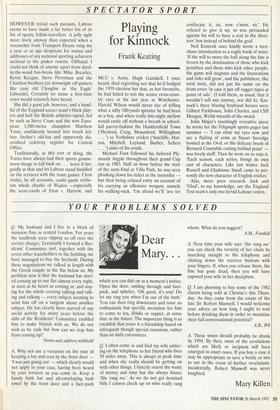SPECTATOR SPORT
HOWEVER trivial such pursuits, Labour seems to have made a far better fist of its list of sporty fellow-travellers. A jolly sight more lively anyway than expected when a researcher from Transport House rang me a year or so ago desperate for names and addresses of any national sporting achievers inclined to the pinker rosette. Offhand, I could not think of anyone apart from dyed- in-the-woad has-beens like Mike Brearley, Kevin Keegan, Steve Perryman and the Charlton brothers (or downright off-putters like zany old Cloughie or 'the Eagle' Edwards). Certainly no name a first-time voter would remotely have heard.
She did a good job, however, and a hand- ful of the England soccer team's black play- ers and half the British athletics squad, led by such as Steve Cram and the new Euro- pean 1,500-metre champion Matthew Yates, confidently booted into touch Jef- frey Archer's old-hat and apparently dis- credited celebrity register for Central Office.
Traditionally, at this sort of thing, the Tories have always had their sporty grouse- moor image to fall back on . . . leave it lan- guidly at that and let Labour stand huddled on the terraces with the team games. Clem Attlee, by all accounts, could quote verba- tim whole chunks of Wisden —especially the score-cards of Eton v. Harrow, and
Playing for Kinnock
Frank Keating
MCC v. Army. Hugh Gaitskell, I once heard, died regretting not that he'd bodged the 1959 election but that, as hot favourite, he had failed to win the senior cross-coun- try race in his last year at Winchester. Harold Wilson would never tire of telling what a nifty 100-yards sprinter he had been as a boy, and when really late-night mellow would rattle off without a breath in school- kid parrot-fashion the Huddersfield Town ('Hesford, Craig, Mountford, Willingham . ') or Yorkshire cricket ('Sutcliffe, Hut- ton, Mitchell, Leyland, Barber, Sellers . . . ') sides of his youth.
Michael Foot followed his beloved Ply- mouth Argyle throughout their grand Cup run in 1983. Half an hour before the start of the semi-final at Villa Park, he was seen plonking down his ticket at the turnstiles — but then being refused entry on account of his carrying an offensive weapon, namely his walking-stick. 'I'm afraid we'll 'ave ter confiscate it, sir, now c'mon, sir.' He refused to give it up, so was persuaded against his will to have a seat in the direc- tors' box instead of behind the goal.
Neil Kinnock once kindly wrote a tren- chant introduction to a rugby book of mine: `If the will to move the ball along the line is frozen by the domination of those who kick penalties and those who kick other people, the game will stagnate and the frustrations and risks will grow', and the publishers, like total twits, did not put his name on the front cover 'in case it put off rugger types at point of sale'. (I told them, as usual, that it wouldn't sell any anyway, nor did it). Kin- nock's three blazing boyhood heroes were Gilbert Parkhouse, John Charles, and Cliff Morgan, Welsh wizards of the sward.
John Major's touchingly evocative piece he wrote for the Telegraph sports pages last summer — 'I can close my eyes now and see a flailing of arms as Stuart Surridge bowled at the Oval, or the delicate brush of Bernard Constable cutting behind point' — was lovely stuff. Then he went on to ruin it: 'Each season, each series, brings its own cast of characters. Like last winter Jack Russell and Gladstone Small came to per- sonify the new character of English cricket.'
Alas, more poor research. Jack and 'Glad', to my knowledge, are the England Test team's only two fervid Labour voters.


























































 Previous page
Previous page